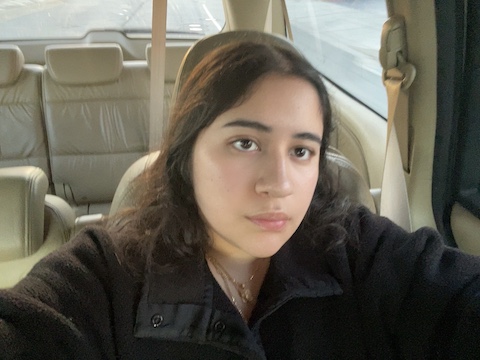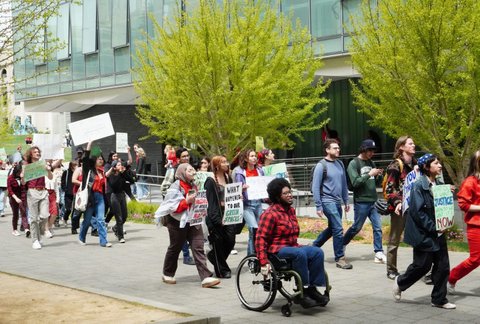
17 Sep ‘My Simple Existence Is Political’: Why Voting Matters to Me at 19

(Author selfie)
Commentary, America Leon
From news articles discussing the presidential race to speeches at each party’s national political convention to memes about presidential candidates on social media, information surrounding the upcoming election has been just about everywhere. Although the present media frenzy has evoked some excitement in me as a first-time voter, and I largely credit my high school AP Government teacher with helping me understand the importance of political involvement, the prospect of voting has been atop my mind for several years.
As an elementary school student, I marveled at the pride and enthusiasm of those around me when Barack Obama was reelected president in 2012. In 2016, I witnessed the anxiety of friends and loved ones who expressed immense fear for their livelihoods in the wake of Donald Trump’s presidency. At the age of 15, I watched as tragedy spread throughout the country in 2020 due to the pandemic and horrifying police brutality, followed by dangerous attempts at undermining American democracy by Trump in the final days of his presidency. And earlier this year, like many people I questioned whether President Biden would be the ideal Democratic presidential candidate due to his age and detrimental handling of the war in Gaza.
Reflecting upon the impact each of these moments has had on me and my loved ones, I realize how my life has always been, and remains, deeply intertwined with politics. So the commonly regurgitated sentiment that presidential elections do not directly impact anyone’s life and, therefore, it does not matter who the president is is one I disagree with firmly. As a first-generation American, daughter of immigrants, and woman of color, my simple existence is political.
I have listened to government leaders and politicians question whether I am a legitimate American due to my family’s immigration status, express their intent to strip away my bodily autonomy as a woman, brush off the blatant environmental racism rampant in predominantly low-income communities like my own, and support policies perpetuating systemic barriers to education for people of color. This, which is my reality, empowers me to vote.
As a newly eligible young voter, however — part of a group with historically low voter turnout — I understand why youth voter hesitancy is so prevalent. In real time, I have seen the immense harm that the power wielded by politicians and government leaders can cause. Feeling overwhelmed or stressed about one’s decision and questioning whether politicians even have young people’s best interests at hand is valid. Still, I would be wary about abstaining from voting entirely. Aside from the presidency, the future of the Supreme Court and ballot measure outcomes are also at stake in this election.
>>>Read: Young Voters Like Me Have a Lot to Weigh This Election<<<
In recent years, I have seen the Supreme Court strike down Roe v. Wade and affirmative action in higher education, both of which disproportionately impact socioeconomically disadvantaged and systemically marginalized individuals. Based on the outcome of the presidential election and the subsequent future of the Supreme Court, same-sex marriage is also at risk of being overturned, as conservative Justice Clarence Thomas expressed an intent to revisit the Obergefell v. Hodges decision.
And, in California, voters could make positive strides for educational equity by voting to build and repair public schools, economic equity by voting to raise the minimum wage, and criminal justice system reform by voting to end involuntary servitude as punishment for crimes, dismantling the remnants of slavery that exist in U.S. prisons.
So while we recognize that oppressive systems exist in the country and within our government, now, more than ever, we must use our voices and votes to advocate for ourselves and our communities.
In this election, my vote and the first ballot I will cast will not only reflect my interests but also the interests of my family members who do not have the privilege of voting, public school kids who learn in underfunded classrooms and highly polluted communities, and women across the country whose liberties and rights to privacy and healthcare are in danger.
Political awareness and involvement are imperative because all our lives are inherently political. We should continue to educate ourselves on social justice issues, critically assess the statements, speeches, and upcoming debates of presidential candidates, research ballot measures to decide what we align with, and equip ourselves to vocalize the criticisms we have of the government leaders meant to serve us.
For the record: A previous version of this story’s headline mistakenly had the author’s age as 18; she is 19.






No Comments